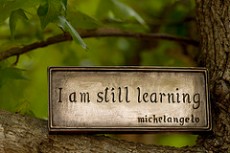The Learning Leader: New Skills for Education in the 21st Century
by Stewart Hase
Writing is always a learning experience for me. It forces greater clarity. In addition, the tranquility of the unique Australian bush setting in which I am currently sitting, miles from anywhere, provides a perfect environment for learning. I’ve been working on a chapter for our new forthcoming book (from Amazon in September) called ‘A Practical Guide to Self-Determined Learning: Experiences from the Field’. It’s an edited work where lots of people share their experiences of using heutagogy in a variety of contexts. It should be fun and, hopefully, useful to people wanting to try something a bit different in their ‘classrooms’.
I got so excited while writing the chapter that I thought I’d share some of its content with you. In this day and age there is no need to be patient, which suits me, as patience is not a strong point. And I might get some comments back to help me refine the chapter before it goes to air.
A number of insightful writers have suggested the skills that people need in order to cope with the 21st century. One of my favourites that appears to summarise all of them is from Jackie Gerstein who has put together a neat pictorial of these skills. See also Tony Wanger’s work, which Jackie acknowledges.
The skills she has identified are: effective oral and written communication; collaboration across networks; agility and adaptability; grit; resilience; empathy and global stewardship; vision; self-regulation; hope and optimism; curiosity and imagination; initiative and entrepreneurialism; and critical thinking and problem solving.
Some of the implications of self-determined learning are:
- involve the learner in designing their own learning content and process as a partner;
- make the curriculum process flexible so that new questions and understanding can be explored as new neuronal pathways are explored;
- individualise learning as much as possible;
- use social media to network learners;
- provide flexible or negotiated assessment;
- enable the learner to contextualise concepts, knowledge and new understanding;
- provide lots of resources and enable the learner to explore essential content;
- experiment and research;
- base practice on the latest science;
- engage learners in collaborative learning;
- differentiate between knowledge and skill acquisition (competencies) and deep learning;
- recognise the importance of informal learning and that we only need to enable it rather than control it;
- have confidence in the learner;
- be on top of the subject area so you can be a resource;
- and recognise that teaching can become a block to learning.
So, what of the skills needed by learning leaders, given the abilities we should foster in our learners and the rather more learner-centric approach prescribed by self-determined learning?
At the outset, I think we need to get rid of the terms teach and teacher from our lexicon and start talking about the ‘learning leader’. It immediately changes the focus from teacher-centred to learner-centred approaches. So, I think what we used to call teaching is really leadership and the broad abilities are similar whether or not you are leading students or leading people in an organisation.
In summary the abilities I think are essential in a learning leader are:
Ability to deal with ambiguity
- Low need for control
- Openness to Experience (one of the Big 5 personality traits)
- Moderate perfectionism
- High Stability (low anxiety)
- Project management skills
- Ability to use social media
- Optimism
The capacity to foster engagement
- An understanding of how to motivate others
- Ability to foster a shared purpose and vision
- An understanding of human needs
- Interpersonal effectiveness
- Ability to self-regulate
- Empathy
The capacity to learn
- Ability to research and learn
- Being thoroughly on top of one’s subject area
- Wide and accessible networks
- Able to share with others
- Knowledge management skills
- The ability to foster collaborative learning
The ability to use open systems thinking
- The capacity to scan the external environment
- Able to foster participative democracy/collaboration decision-making and process
- Able to actively diffuse power
- Capacity to work in a team
- Ongoing internal and external analysis of effectiveness (continuous improvement)



This is right on the money Stewart. Today’s education leaders must first and foremost be learners, and all teachers must view themselves as learning leaders. I’d love to discuss where this might go with you.
I prefer to use the term mentor or learning mentor instead of learning leader in the heutagogical software development courses I am responsible for at the university where I work. The term learning leader tends to re-enforce misconceptions in the minds of the learners regarding their and my roles. The phrase “then why don’t you lead?” is not that much different than “then why don’t you teach?” when the learner is really saying “then why don’t you tell me what to do/know?”
I have grown into an understanding of heutagogical practice by first doing it, and then researching and reflecting on what was actually happening. When I discovered the term, it made sense. I’ve also become a rhizomatic learning disciple.
The essential abilities you outline here are right on.
Pingback: The Learning Leader | Rogersvlle's Blog